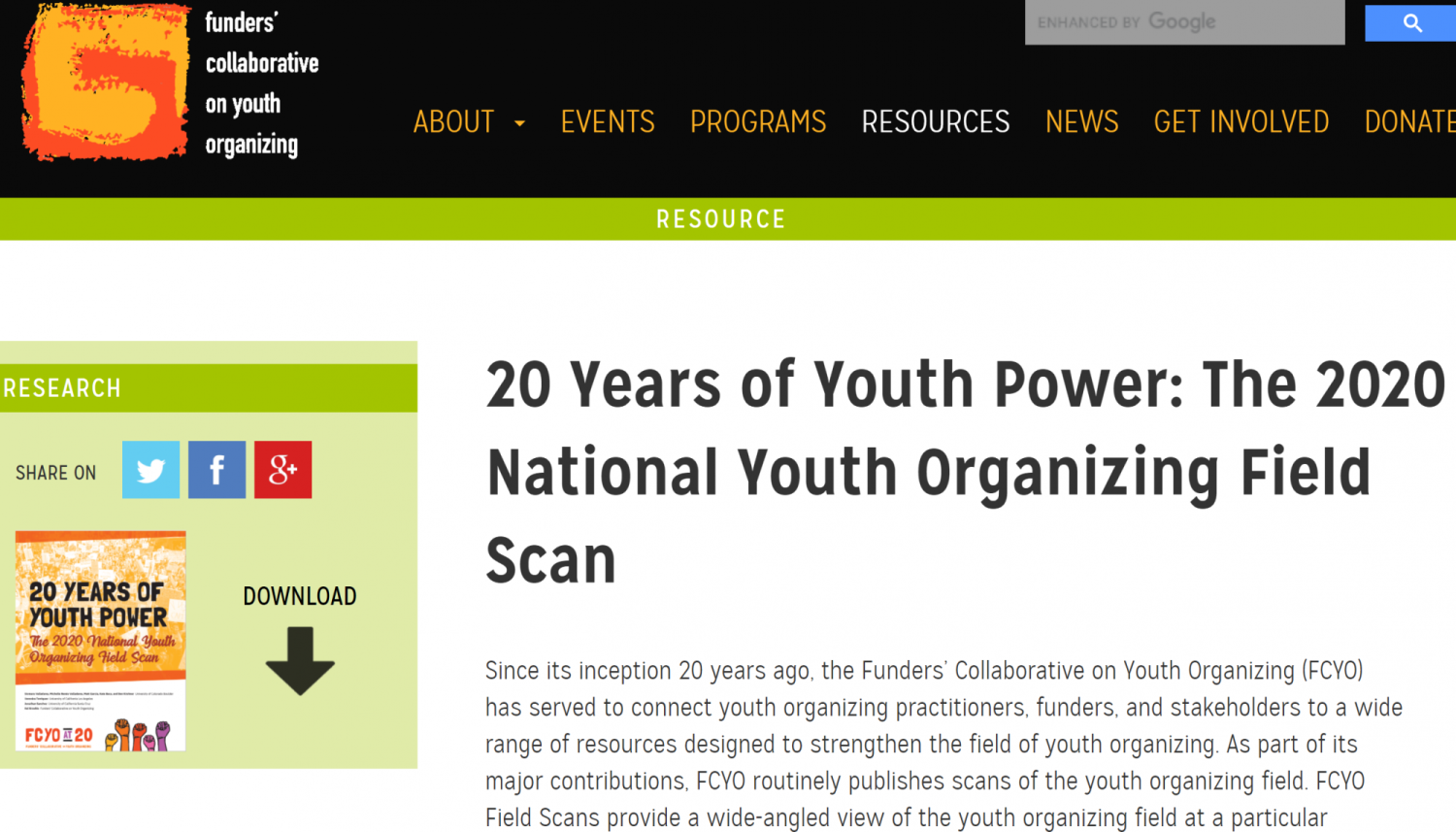Research Hub contributes to new Youth Organizing Field Scan

Young activists gained media attention in 2020 for their calls for racial reckoning, immigration rights, and new climate policies. But contrary to popular accounts, youth activism was neither a spontaneous response to current events nor due to the heroic work of individual students. For the past twenty years, young people and adult allies have been organizing -- steadily, patiently, and with a long-term vision -- for social justice in the United States. The Research Hub for Youth Organizing is excited to announce a new report that tells this story.
What are the goals of youth organizing? What policy issues do youth organizers work on? How do today’s campaigns connect to earlier generations of youth movements? These are the kinds of questions that are answered in, “Twenty Years of Youth Power: The 2020 National Youth Organizing Field Scan,” which is a collaborative report from the Research Hub, the Funders Collaborative for Youth Organizing (FCYO), and colleagues at UCLA, UC Santa Cruz, and COMM|VEDA consulting.
The final report showcases survey data from 312 surveyed organizations and documents interviews with 59 organizers. All data for the final report was collected between 2019-2020. According to Siomara Valladares, “This report is a testament to the invaluable work of youth organizers. Their reflections and lessons learned over the last two decades stand as a contribution to the field and their communities.”
In telling the story of youth organizing since 2000, the report also highlights recent developments by organizing groups. During the covid pandemic, for example, youth activists led efforts to help communities navigate the Covid-19 pandemic and develop new forms of mutual aid. Also, whereas twenty years ago youth organizers were far less likely to be involved in voter engagement, according to the most recent survey more than a third of groups prioritized voter engagement. Youth organizers have also led campaigns on improving school climate, improving school wellness, expanding mental health issues, and improving juvenile justice. As one youth organizer put it, “young people were like, ‘Yeah, this is possible. We can definitely do policy change. We can definitely advocate, and we can do it with these few or a couple organizations we have in [our county].”
The 2020 Field Scan highlights the ways youth organizing efforts have shifted to more effectively bring about social change. “Almost all groups in our survey (98%) indicated that they participate in networks and alliances versus 77% in the 2013 Field Scan,” said the report. The youth organizing field is also increasingly diverse--by race, ethnicity, gender, sexual orientation and more-- and that diversity has helped youth organizers increase social justice and equity for the country as a whole and within their local communities. Youth are not only diversifying demographically, they are also diversifying the scope of their reach geographically-- youth organizers from 36 states responded to the survey. The most recent scan highlights an increase in youth organizations both in rural states and rural zip codes near dense urban areas.
The report explains that today’s youths will “face the effects of climate change, global health crises, and increasing wealth disparities.” In order to effectively enact change in the world, youth organizers have demonstrated an increased capacity to locate centers of power and leverage knowledge and activism to advance their interests. Understanding how to navigate and manipulate complex systems has helped youth organizations create meaningful and long-lasting change. “Youth organizers are looking to ensure that their day-to-day organizing work is tied to a longer-term strategy for transformative change,” said the report.
Going forward, youth organizing will play a pivotal role in forging a more equitable future for the United States. Given the inequities that have been highlighted during the last several years, it is clear that in order for the country to progress, the United States must go through transformational change. Youth organizers have demonstrated that they understand what needs to be done and are up to the task of completing the work which has never been needed more than it is now. “The youth organizing field is poised to lead this nation in healing from the COVID pandemic, in bringing racial reckoning to our school systems, health care systems and other critical public institutions, and in pushing for deep investment in communities rather than complacency or acceptance of the economic crisis,” said the report. In order for youth organizations to advance their work, they must have the support they need. “As the field of youth organizing grows in size, geography, and power so too must our support and solidarity,” said the report.

